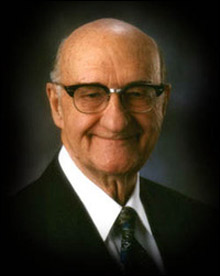
FEAR OF GOD Mormon thinker Cleon Skousen warned in his works of a mega-conspiracy in which communists and capitalists would seek world domination. |
Deep ties to the past
To be fair, the media haven’t totally ignored the significance of Beck’s Mormonism. In September, Salon published several stories by Alexander Zaitchik, author of a forthcoming Beck biography, on Beck’s improbable march to conservative superstardom. One — “Meet the Man Who Changed Glenn Beck’s Life” — focused on Beck’s deep ties to Cleon Skousen, an eccentric, prolific Mormon thinker who died in 2006. These days, Skousen is best known as the author of The Five Thousand Year Leap, a book that dubs the US Constitution a “miracle” and casts the Founders as deeply Christian men. Beck has lavishly praised The Five Thousand Year Leap on air, and even wrote the foreword for a new edition of the book; as a result, this formerly obscure text is now a bestseller in its own right.But Skousen wasn’t just a cheerleader for Christianity. He was also a zealous purveyor of conspiracy theories, obsessed with communism in his earlier years and later warning of a vast mega-conspiracy in which communists and capitalists joined forces to seek total world domination.
Oddly, Skousen’s mega-conspiracy clarion call — a 1970 volume titled The Naked Capitalist — was actually a book-length pseudo-review of Tragedy and Hope, a sprawling tome by the Mormon historian Carroll Quigley (who taught future president Bill Clinton at Georgetown). Stranger still, Quigley insisted that Skousen had fundamentally misinterpreted his work. “Skousen is apparently a political agitator. I am an historian,” Quigley complained in Dialogue, a Mormon intellectual journal, in 1971. “I never anywhere said that financial capitalism or any of its subsidiaries sought to ‘support communism.’ ”
Nonetheless, The Naked Capitalist gained a wide readership at Brigham Young University (BYU), where Skousen was a professor of religion — and where he apparently taught one Willard Mitt Romney. (One internecine Mormon squabble, one former president, and one serious presidential contender . . . what are the odds?)
Of course, just because Beck’s politics are Skousenian doesn’t necessarily mean they’re deeply Mormon. No intellectual tradition can be reduced to one individual — and in 1979, the LDS Church formally distanced itself from the Freemen Institute, which Skousen founded in 1971 to promulgate his half-baked ideas. (At the time, the LDS Church was led by Spencer Kimball, known for receiving the revelation that finally opened the Mormon priesthood to black men. For his part, Skousen accused critics of this notorious racial ban of using communist tactics.)
But Skousen is hardly Beck’s only major Mormon influence. His understanding of present-day realities also reflects the paranoid anti-communism of Ezra Taft Benson, who served as secretary of agriculture in the Eisenhower administration and later, from 1985 to 1994, as president of the LDS Church. (According to Mormon doctrine, each church president, at the time of his service, functions as a living prophet.)
Beck made his troubling fondness for Benson explicit just before the 2008 presidential election, while riffing on the comments of a clueless Obama supporter who was caught on tape saying that Obama’s election would mean no more gas or mortgage payments. On his October 31, 2008, radio show, Beck cited these absurd remarks as evidence that a dire prediction made by Benson in 1966, during a speech at BYU, could soon come to pass.